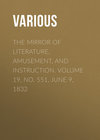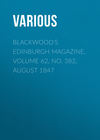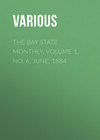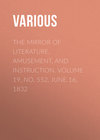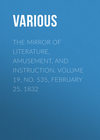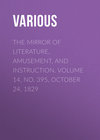Loe raamatut: «Graham's Magazine Vol XXXII No. 6 June 1848», lehekülg 3
A SONG
BY THOMAS BUCHANAN READ
Bring me the juice of the honey fruit,
The large translucent, amber-hued,
Rare grapes of southern isles, to suit
The luxury that fills my mood.
And bring me only such as grew
Where rarest maidens tent the bowers,
And only fed by rain and dew
Which first had bathed a bank of flowers.
They must have hung on spicy trees
In airs of far enchanted vales,
And all night heard the ecstasies
Of noble-throated nightingales:
So that the virtues which belong
To flowers may therein tasted be —
And that which hath been thrilled with song
May give a thrill of song to me.
For I would wake that string for thee
Which hath too long in silence hung,
And sweeter than all else should be
The song which in thy praise is sung.
THE ENCHANTED ISLE
BY MRS. LYDIA JANE PEIRSON
Far in the ocean of the Night
There lyeth an Enchanted Isle,
Within a veil of mellow light,
That blesseth like affection's smile.
It tingeth with a rosy hue
All objects in that country fair,
Like summer twilight, when the dew
Is trembling in the fragrant air.
And there is music evermore,
That seemeth sleeping on the breeze.
Like sound of sweet bells from the shore
Lingering along the summer seas.
And there are rivers, bowers, and groves,
And fountains fringed with blossomed weeds,
And all sweet birds that sing their loves
'Mid stately flowers or tasseled reeds.
All that is beautiful of earth,
All that is valued, all that's dear,
All that is pure of mortal birth,
Lives in immortal beauty here.
All tender buds that ever grew
For us on Hope's ephemeral tree,
All loves, all joys, that e'er we knew,
Bloom in that country gloriously.
There is no parting there, no change,
No death, no fading, no decay;
No hand is cold, no voice is strange,
No eye is dark – or turned away.
To us, who daily toil and weep,
How welcome is Night's starry smile,
When in the fairy barge of Sleep
We visit the Enchanted Isle.
All holy hearts that worship Truth,
Though bleak their daily pathway seems,
Find treasure and immortal youth
In that fair isle of happy dreams.
But, if the soul have dwelt with sin,
It landeth on that isle no more,
Though it would give its life to win
One glimpse but of the pleasant shore.
Their joys, which have been thrown away,
Or stained with guilt, can bloom no more,
And o'er the night their vessels stray
Where pale shades weep, and surges roar.
THE CONTINENTS
BY J. BAYARD TAYLOR
I had a vision in that solemn hour,
Last of the year sublime,
Whose wave sweeps downward, with its dying power
Rippling the shores of Time!
On the lone margin of that hoary sea
My spirit stood alone,
Watching the gleams of phantom History
Which through the darkness shone:
Then, when the bell of midnight, ghostly hands
Tolled for the dead year's doom,
I saw the spirits of Earth's ancient lands
Stand up amid the gloom!
The crownéd deities, whose reign began
In the forgotten Past,
When first the glad world gave to sovereign Man
Her empires green and vast!
First queenly Asia, from the fallen thrones
Of twice three thousand years,
Came with the wo a grieving goddess owns
Who longs for mortal tears:
The dust of ruin to her mantle clung,
And dimmed her crown of gold,
While the majestic sorrows of her tongue
From Tyre to Indus rolled:
"Mourn with me, sisters, in my realm of wo,
Whose only glory streams
From its lost childhood, like the artic glow
Which sunless Winter dreams!
In the red desert moulders Babylon,
And the wild serpent's hiss
Echoes in Petra's palaces of stone
And waste Persepolis!
Gone are the deities who ruled enshrined
In Elephanta's caves,
And Brahma's wailings fill the odorous wind
That stirs Amboyna's waves!
The ancient gods amid their temples fall,
And shapes of some near doom,
Trembling and waving on the Future's wall,
More fearful make my gloom!"
Then from her seat, amid the palms embowered
That shade the Lion-land,
Swart Africa in dusky aspect towered —
The fetters on her hand!
Backward she saw, from out her drear eclipse,
The mighty Theban years,
And the deep anguish of her mournful lips
Interpreted her tears.
"Wo for my children, whom your gyves have bound
Through centuries of toil;
The bitter wailings of whose bondage sound
From many a stranger-soil!
Leave me but free, though the eternal sand
Be all my kingdom now —
Though the rude splendors of barbaric land
But mock my crownless brow!"
There was a sound, like sudden trumpets blown,
A ringing, as of arms,
When Europe rose, a stately Amazon,
Stern in her mailéd charms.
She brooded long beneath the weary bars
That chafed her soul of flame,
And like a seer, who reads the awful stars,
Her words prophetic came:
"I hear new sounds along the ancient shore,
Whose dull old monotone
Of tides, that broke on many a system hoar,
Wailed through the ages lone!
I see a gleaming, like the crimson morn
Beneath a stormy sky,
And warning throes, my bosom long has borne,
Proclaim the struggle nigh!
"The spirit of a hundred races mounts
To glorious life in one;
New prophet-wands unseal the hidden founts
That leap to meet the sun!
And thunder-voices, answering Freedom's prayer,
In far-off echoes fail,
As some loud trumpet, startling all the air,
Peals down an Alpine vale!"
O radiant-browed, the latest born of Time!
How waned thy sisters old
Before the splendors of thine eye sublime,
And mien, erect and bold!
Pure, as the winds of thine own forests are,
Thy brow beamed lofty cheer,
And Day's bright oriflamme, the Morning Star,
Flashed on thy lifted spear.
"I bear no weight," so rang thy jubilant tones,
"Of memories weird and vast —
No crushing heritage of iron thrones,
Bequeathed by some dead Past;
But mighty hopes, that learned to tower and soar,
From my own hills of snow —
Whose prophecies in wave and woodland roar,
When the free tempests blow!
"Like spectral lamps, that burn before a tomb,
The ancient lights expire;
I wave a torch, that floods the lessening gloom
With everlasting fire!
Crowned with my constellated stars, I stand
Beside the foaming sea,
And from the Future, with a victor's hand
Claim empire for the Free!"
JEHOIAKIM JOHNSON
A SKETCH
BY MARY SPENCER PEASE
What unlucky star it was that presided over the destiny of my cousin Jehoiakim Johnson I am not astrologer enough to divine. Certain only am I that it could have been neither Saturn, Mercury, Mars, nor Venus; for he was far from being either wise, witty, warlike, or beautiful.
Cowper says every one falls "just in the niche he was ordained to fill." Cowper was mistaken in one instance, for Cousin Jehoiakim had no niche to fall into, but went wandering about the world, (our world,) without any thing apparently to do, or any where apparently to stay: And just the moment you wished him safe in Botany Bay, just that very moment was he standing before you with his – but never mind a description of his face and person. All cannot be handsome; folks unfortunately do not make themselves – and precisely the moment you became indifferent as to his presence, or if – a very rare thing – you wished it, that very instant he was no where to be found.
"Our world" was situated in good old New England, around and about Boston; and we, "our folks," were of the better class of farmers, and lived within a day's ride of the city.
Never in my life have I been happier than in that free, green country, with the broad, bright sky above me, and the clear, heaven-wide air around me; and bird and beast frolicking in freedom and gladness near and about me. I loved them all, and all their various noises, even to the unearthly scream of our bright, proud peacock. I shut my eyes and see them still; the world of gay-plumaged birds, with their sweet, wild songs, the little white-faced lambs, the wee, roly-poly pigs, the verdant ducks, the soft, yellow goslins, and the dignified old cows stalking about. Well do I remember each of their kind old faces. There was the spotted heifer, with an up-turned nose, and eyes with corners pointing toward the stars. If ever a cow is admitted into heaven for goodness, it will surely be Daisy. Then there was the black Alderny, and the – but leaving beef revenons à nos moutons– Cousin Jehoiakim. Still the place of all others to enjoy life, life unconstrained by city forms, life free, free as heaven's wind, is on a New England farm. My heart bounds within me as I look back at the dear old homestead. Just there it lies in the bend of the time-worn road that winds its interminable length through dark elms – the gothic ivy-clad elms – and through black giant pines, and the bright-leaved, sugar-giving maple, and golden fields, hedged in by ragged fences, formed of the roots and stumps of leviathan trees.
You see that picket-gate? open it, and a path bordered on each side by currant bushes, and gooseberry bushes, and the tall cyranga, and the purple lilac, will lead you through an arbor of fine Isabella's and Catawba's to the dear old homestead, now in possession of Brother Dick and little Fanny, his better half.
I could describe every nook of that darling old house, and every thing surrounding it, from its old-fashioned chimneys – wherein the domestic swallows have sung their little ones to sleep each successive summer, time out of mind – to the unseemly nail that projected its Judas-point from one of the crosspieces of that same little gate, and which always contrived to give a triangular tear to my flying robes every time they fluttered through that dear little gate. Just imagine the happy moments I spent under the great old willow by the well, darning those same triangular rents. Still has all this nothing to do with Cousin Jehoiakim Johnson. You have probably seen folks that were often in your way; now, he was never any where else. Always in the way, and always ungraceful. He was not ungraceful for lack of desire to please: bless his kind, officious heart! Oh, no! Was there a cup of coffee to be handed, and were there a half dozen waiters ready to hand it, he was sure to thrust forth at least ten huge digits, and if he chanced to get it in his grasp, wo to the coffee! and wo to the snow-white damask table-cloth! or worse, wo to one's "best Sunday-go-to-meetin'" silk dress. Nature uses strange materials in concocting some of her children – most uncouth was the fabric of which she constructed Jehoiakim Johnson.
Poor fellow! he is dead now – peace to his soul. Do you know I fancy it lies hid in the breast of my dog Jehu – the most ungainly, the best-natured creature alive. My baby rides his back, and pulls his ears. I never heard him growl. Oh! he is a jewel of a dog.
Poor Cousin Jehoiakim! Among his other plaisanteries he came near losing for me a noble husband. Patience, and I will relate how it came to pass.
Sister Anna and myself – that sister of mine, by the way, was a complete witch; all dimples and fun, with blue eyes that darted here and there, dancing in her head for very gladness; with a mouth on which the bright red rose sat like a queen on her throne. Her words I can liken to nothing but to so many little silver bells, ringing out into the clear air in joy and sweetness. And never have I heard those musical bells jingle one harsh or unharmonious sound. She is married now – poor thing – and the mother of three "little curly-headed, good-for-nothing, mischief-making monkeys."
Notwithstanding her exceeding loveliness, Cousin Jehoiakim preferred me, and actually offered me his great broad hand, as you shall see. She was a perfect Hebe, while my style of beauty was more of the – though to confess the "righty-dighty" truth, as little folks say, my beauty was of that order which took the keenest of eyes to discover. There were a pair, however, dark, and full of soul, that dwelt with as much delight on me as though I were Venus herself.
Oh! those were dear, darling eyes, and were in the possession of the best, yes, the very best specimen of Nature's modeling that New England contained; Nature wrought him from the finest of her clay, after her divinest image, and his parents named him Edgar Elliott.
Sister Anna and myself had been making our usual Christmas visit to Aunt Charity, or Aunt "Charty," as we used to call her, in good old Yankee language. Aunt Charity dwelt in Boston; and was the wife of a very excellent man, in very excellent circumstances; and the mother of seven dear, excellent boys, of whom Cousin Jehoiakim Johnson was not one.
How delightfully flew our days on this particular Christmas visit. I felt myself in a new world. A world of brighter flowers, and brighter sunshine; for, although I was eighteen, never until then had I been any thing but a wild, thoughtless, giddy child. And then? – the truth is a new star had burst upon my horoscope, bright and beautiful, that so bewildered my eyes to look upon, I was forced to awake my heart from its long sleep, to supply the place of eyes. Steadfast it gazed into that bright star's heaven-lighted depths, until I recognized it as my guiding star – my Destiny!
Oh, Love! thou angel! thou devil! thou blissful madness, thou wise folly! Thou that comest clad in rainbow garments, with words more full of hope than was the first arch that spanned high heaven, stouter hearts than mine have been compelled to own thee master. Prouder hearts than mine have listened to the witcheries of thy satin-smooth tongue until they forgot their pride. More ice-cold ones than mine have been consumed in the immortal fire thou buildest – the heart thine altar, Love, thou monarch of the universe!
Every thing has an end – a consolation oftentimes – rhapsody, as well as love, and so had that happy Christmas-time, when we were so merry, when I first saw that master-piece of nature – my Destiny – Edgar Elliott.
Anna and myself had been home but three weeks – three dreary years of weeks, Anna said – when we received a letter containing the joyful intelligence that Edgar Elliott, his aristocratic sister Jane, his unaristocratic sister little Fanny, and Herbert Allen – a young lieutenant, by the way, and, by the way, the red-hot flame of my harem-scarem sister – would all four honor Dough-nut Hall, the name we had playfully given our old homestead, with a speedy and long visit.
Joy and hope danced in our hearts when, clear and sunny, the promised day at length had come, the snow five and a half feet deep – the greatest depth of snow within the memory of the "oldest inhabitant" – the mercury full ten degrees below zero. I had just changed my dress for the fifth time, and sister Anna was offering me this consolation, "I must say, Clara, that that is the most unbecoming dress you have, you look like a perfect scare-crow," when the sound of sleigh-bells coming up the avenue, sent my heart up in my throat, and myself quicker than lightning down to the "hall-door," there to welcome – not my darling Edgar and his proud, beautiful sister, and Anna's Adonis lieutenant, and Brother Dick's pretty little Fanny – no, none of these, oh, no! who but my long-visaged, good-for-nothing cousin Jehoiakim Johnson.
"Fiddle-de-dee!" exclaimed a voice at my elbow; and my disappointed sister skipped, with chattering teeth, back into the house.
The stage drove off, after depositing cousin Jehoiakim and a Noah's-ark of a trunk.
"Wall, Cousin Clarry!" exclaimed he, springing toward me with one of his own peculiar bear-like bounds. "How du you du? I guess you didn't expect me this time, no how."
"I can't say that I did," said I; "but do come in, this air is enough to freeze one."
"Wall, here I am again," said he, rubbing his great hands together before the blazing hickory. "But if that wasn't a tarnel cold drive; and if this isn't a nation good fire, then I don't know. But how are uncle and aunt, and Cousin Anna, and Dick, and little Harry?"
"All quite well. Where have you been since you left here, cousin?"
"Why I went right to Cousin Hezekiah's; but I did not stay there quite two months, because little Prudence caught the brain fever, and I was obliged to keep so still that it was very unpleasant. I went from there to Cousin Ebenezer's. Wall, I stayed to Cousin Eb's four months or so; then I went to stay a couple of months with Cousin Pildash and Axy, (Achsa.) So this morning I came from Uncle Abimelech's. I only stayed there a few weeks, because – But, Cousin Clarry, du look! if there isn't a sleigh-load of folks coming."
I did look, and saw coming through the great open gate, and up the avenue, a sleigh, all covered with gold and brown, glittering in the sun's setting rays. I saw the long, white manes of the ponies, and the heavy plumes of my beautiful friend, Jane, streaming far in the wind; and then I saw little Fanny's bright, happy face, and the fierce moustache of Anna's lieutenant; and then I saw a pair of dark, earnest eyes, full of devotion, gazing into mine as though at the shrine of their soul's ideal. Never shall I forget the look they wore, so inexpressibly full of affection was it.
What a pity stars should set. What a pity that eyes, once overflowing with the light of wildest, truest love, should grow cold and dim. A pity, too, that love cannot always be love – that it should find its grave so often in hate, or indifference, or in sober friendship. Still that it does not always, let us bless Love, and think that the fault lies in us, and not in Love, that we are grown so like the clay of which our bodies are made, that Love, the spirit, cannot find an abiding-place within us; and, as years come over us, we are content more and more to harden our hearts, and bask, like butterflies, in the external sunshine of this beautiful world, until the world within – the world of thought and feeling – is a weary one, gladdened only with a few flowers of transcendent sweetness and brightness – rewards of merit from this work-day, lesson-learning earth.
Meantime were those warm eyes looking love upon me; and meantime, from out a world of buffalo-robes and furs, were our merry friends emerging; and then a fervent pressure of a soft, warm hand sent the bright blood burning to my very temples. Then came numerous other shakes of the hand, and question sounded upon question, and laugh pealed upon laugh; a gayer, merrier, madder party never met together. Sister Anna, and Brother Dick's little love of a Fanny, were a host of mirth in themselves. The accession of so many merry faces seemed to act on the uncouth spirits of my Cousin Jehoiakim like so much exhilarating gas; for scarcely were we housed, when he suddenly caught me up in his windmill arms, and twirling me around as though I had been a feather, exclaimed, "Bless us! Cousin Clarry, I have scarcely had a chance to say how du you du, and to tell you how glad I am to be here once more. Arn't you tickled to death to see me?"
Indignant and breathless, I sprang from him, saying, "Really, Cousin Jehoiakim, I should be much more delighted to see you if you would be kind enough to manifest a less rude way of expressing your joy."
"Oh! beg pardon, Cousin Clarry. I forgot you had grown up into a young woman; another word for touch-me-not – ha! ha! ha! I guess you are all dressed up, tu; you look like a daisy, anyhow."
With that he threw himself back in a perfect roar of ha! ha's! and he! he's! My eyes glanced around to see the effect produced on my friends by my gauche cousin. The great blue eyes of the aristocratic Jane opened themselves wider and more wide, while the merry black ones of little Fanny seemed to enjoy the sport. The lieutenant's moustache curled itself a little more decidedly, as he surveyed Jehoiakim Johnson; looking upon him, probably, as on some savage monster. I thought I perceived a darker shade in Edgar's eyes. It soon passed over, and we all became quiet and chatty. The twilight deepened around us, meantime, and the shadows formed by the blazing hearth grew more and more opaque, and more and more fitful, lengthening themselves over carpet, chairs, and sofas, to the very farthest corner of the room, darting all manner of fantastic forms upon Sister Anna and her handsome lieutenant, as they sat over by the window, in earnest conversation. Yes, Sister Anna, for once wert thou earnest. Upon our group on the sofa, before the hearth, fell also those strange fire-light shadows. Sweet little Fanny! how like a little fairy didst thou look in that flickering fire-light; thy graceful form, half reclining, thrown carelessly on the sofa; thy long, curling hair flowing in dark clouds over thy snow-white dress, and nearly hiding thy happy, child-like face, and bright eyes, that glanced out on Brother Dick, who, entranced, was devoutly bending over thee, gazing on thy sunny face – what he could see of it. Sweet little Fanny! And thy proud, beautiful sister, Jane – sitting beside me, and near thee; well did that gleaming light reveal her noble outline of face and form contrasting so finely with thine. Nor did those wayward shadows spare our dear mother, but daguerreotyped all manner of merry-andrews on her sober satin dress, as she sat over on a lounge, quietly talking with my dear, sweet Edgar, who employed his leisure moments in throwing sundry loving glances over at me. Nor did these weird shadows spare our Cousin Jehoiakim Johnson in the great old-fashioned arm-chair, where he had flung himself, seemingly wrapped in meditation most profound. They frolicked over his broad, square shoulders like the Liliputs upon Gulliver, dancing all sorts of fantastic dances, pulling at his ears, and tweaking his substantial nose, when a snore of most immense magnitude broke on our quiet ears. Then another and another, each louder than the last. Ah! Cousin Jehoiakim, most profound was thy meditation.
Now I am not going to weary your patience by telling you how just then our "help" entered, one bearing a tray-full of tall sperm candles, another an immense waiter, crowned with the thick-gilt, untarnished china, that had been handed down in our family by four successive generations – we had begged our dear mother to let the tea, the tea only, be handed around as it was done in Boston; she in an evil hour consenting. Nor how Cousin Jehoiakim, aroused from his meditation by the glare of light, starting up, cast his eyes upon Mercy, the stout serving maiden, and bearer of that same precious porcelain – for which my dear mother's reverence was as great, every whit, as that of Charles Lamb's for old China; and how the next moment the waiter was in the hands of my six feet seven and a-half cousin, with "Du let me help you, young woman!" and how the next instant the six feet seven and a-half formed a horizontal line with the floor, instead of a perpendicular one; and how the glittering fragments of gold and white glistened from under every chair, and from the hearth, and out from among the ashes, like unto so many evil eyes glaring upon him for his stupidity and carelessness; and how little Fanny unwound from one foot of the prostrate six feet seven and a-half several yards of snow-white muslin – the innocent cause of the disaster; and how, light as a bird, she sprung, merrily laughing, from the room, with the fluttering fragments of her cobweb dress gathered in an impromptu drapery around her graceful little form.
No; I will not fatigue you with the history of that unlucky adventure; nor how, but a short time after, when we had taken tea from less costly China, and had fallen into a witty, merry uttering of each other's thoughts, we were interrupted by screams the most – but never mind what kind, seeing I have said you shall not be fatigued with a description of what was nothing but an immense kettle of boiling lard flowing quietly and river-like over the long length of the before so spotless kitchen floor, with many a cluster of dough-nut islands interspersed, by way of relieving the said river of monotony. Our dear mother was famed for miles around for the profusion and superiority of her dough-nuts, hence our soubriquet – "Dough-nut Hall." And, seeing that Mercy was only scalded half to death, the guilty culprit, who insisted that the kettle was "too heavy for a woman to lift," escaping unhurt, that is bodily – his remorse of conscience being truly pitiable. No; none of all this, with long, ugly sentences, shall you have; no, nor a detail of his many daily, hourly, and almost momently, misadventures; how once, when we were sitting in Miss Elliott's room, in he bolted with, "Bless my soul! what a lot of industrious women-folk! 'How doth the busy bee;'" that new and elegant little poem was, word for word, recited. Little Fanny he found making a bead purse for Brother Dick, and examining her box with every conceivable shade of bead duly assorted, and separated from each other by innumerable partitions. No matter what he said about them, only the beads were spilled, and the purse could not be finished; and then were Miss Jane's delicate brushes passed through his wondering red hair before a saving hand could arrest them; then was Miss Jane's beautiful inlaid dressing-box broken irreparably; and then – but I will tell you what I will relate you – all about our sleigh-ride and country ball. Yes! that you must know; not because it is worth telling, but because I should like you to hear it – all about how I nearly lost my darling. But to commence.
Rumors were afloat of this said ball, the countriest kind of a country ball, to take place in Squire Brown's barn, the largest, best built barn for miles around. Our city friends entered into the spirit exactly, and determined on going. "Cousin Jehoiakim? Oh, he need know nothing about it," said Sister Anna; "or we can easily deceive him as to the day, without telling him very much of a lie." Ah! Sister Anna. The important day arrived. In one great bandbox reposed various satins, laces, and ribbons too numerous to mention; the owners thereof were standing cloaked, hooded, and muffed, ready to start. The distance was ten miles. We had cast lots for the sleighs, and had agreed on exclusiveness, though not exactly the exclusiveness that Sister Anna wickedly proposed, viz., that each brother should take his respective sisters in due decorum. The new "cutter" of my brother's was drawn by himself; and he had already started with his little Fanny by his side. The proud, beautiful Jane – I really believe I had forgotten to mention that, while Cousin Jehoiakim was upsetting chairs, and spilling pitchers of water, and breaking glasses, and treading on people's toes, and the cat's tail, a distant cousin of ours arrived – rather a guess cousin than Cousin Jehoiakim; tall as the last named, to be sure, but bearing about the same resemblance to him as a vigorous, graceful young willow does to an overgrown mullen stalk. This new cousin – by cognomen Clarence Spencer – the family name our own, by the way – proud and beautiful as the haughty Jane herself – had seen fit to fall most gracefully in love with her. These two, therefore, were just started on their way to the ball, in Clarence's own incomparable turn-out. Lieutenant Allen had drawn the Elliott's beautiful gold and brown sleigh. He was holding the impatient ponies, and Sister Anna was arranging the cushions when Cousin Jehoiakim hove in sight. Sister Anna sprung like a doe to the front seat, threw the heavy buffalo-robes about, making them and the great bandbox fill up the back seat, and seating herself by the lieutenant – all this quicker than lightning – and giving the ponies a touch of the whip, on they dashed to the imminent peril of their necks as well as her own. A saucy toss of the head was all she vouchsafed me. All, then, were on their way save Edgar and myself, who were expecting a quiet, loving talk in the comfortable old-fashioned "pung," with a gig top, that papa used in his frequent drives to Boston.
"Wall, now, Cousin Clarry, I reckon you thought I didn't snuff what was going on."
Poor fellow! he looked so good-natured, truly my heart smote me.
"There is another cutter in the barn, cousin," replied I, "and you can take your pick of the horses."
"You are very kind, Cousin Clarry, but there ain't no occasion of calling any more of the poor dumb critters out into the cold. I guess you can make room for me; I will ride on top until we catch up to some of the two-seated sleighs."
Time was too precious to waste in words, and as Cousin Jehoiakim good naturedly persisted that he should be very comfortable on the top, on the top he seated himself. I saw that Edgar did not like the arrangement, but he was too polite, or too proud to interfere. "Let us overtake the others," said he. A bright smile passed over his face. I saw he meditated some mischief. I knew it could not be very mischievous mischief, for a kinder, nobler heart never beat more warmly in any human breast. Forward dashed the horses, throwing the white, sparkling snow before and around them into the bright sunshine. Faster and faster sped the spirited horses, until we passed, first – yes, it was no illusion, his lips were actually pressing her little rosy mouth. Then, Lieutenant Allen, you are not the first man that has done the like; it is a way they all have, ever since Adam gave Mother Eve her first love-kiss. What man would not part with some years of his life for the privilege of pressing to his own a pretty little soft mouth?
Ah, Sister Anna! the question was actually popped; and on that memorable day of the ball, thy giddy heart was actually caged. We came so noiselessly and swift through the soft snow that we actually took thee by surprise. Thy blushes were beautiful; but on we sped, and our next tableaux presented Cousin Clarence gazing most intensely and earnestly into the great deep-blue eyes of the beautiful Jane Elliott, as though he were pouring forth a question from his soul to hers. Her delicate hand lay in his, and her stately, graceful head inclined gently toward him. They were so earnestly occupied, he in talking, and she in listening, that they did not see us until we had passed them; and after we passed them we were not long in overtaking Dick and his little Fanny. Bless the lovers! Her curly-headed little head started, quick as lightning, from its warm resting place, though not so quick but that my practiced eye saw it take leave of Brother Dick's manly shoulder. Her fun-loving spirit could not resist the ludicrous appearance of Cousin Jehoiakim, perched upon the top of our pung like some immense bird of prey. Brother Dick joined in her pealing, merry laughter, and the old woods rang again. The stump of a tree grew at the road-side, near an immense snow-bank. Edgar, as though he had been on the look-out for such a fine opportunity, speedily and dexterously ran one runner of our pung over the stump, and over went the pung. By a skillful movement he righted it instantly. The friendly side preserved me from the snow; but Cousin Jehoiakim – alas! for gravity on a gig-top. In this deep bank of snow, his heels high in air, stood my inverted cousin. As soon as I could speak from convulsive laughter, I implored Edgar to go back to my cousin's assistance.












